【2015中考复习方案】(外研·全国)2015届九年级英语复习课件(自学反馈+重点突破)第1课时 预备级-Module 4[七年级上册](共40张PPT)
文档属性
| 名称 | 【2015中考复习方案】(外研·全国)2015届九年级英语复习课件(自学反馈+重点突破)第1课时 预备级-Module 4[七年级上册](共40张PPT) |
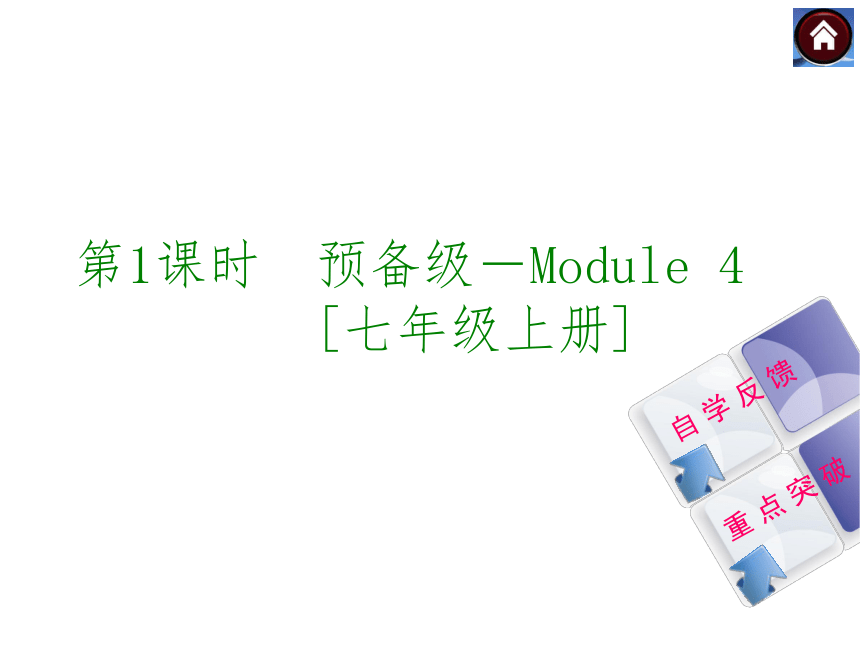
|
|
| 格式 | zip | ||
| 文件大小 | 434.6KB | ||
| 资源类型 | 教案 | ||
| 版本资源 | 外研版 | ||
| 科目 | 英语 | ||
| 更新时间 | 2015-01-07 00:00:00 | ||
图片预览

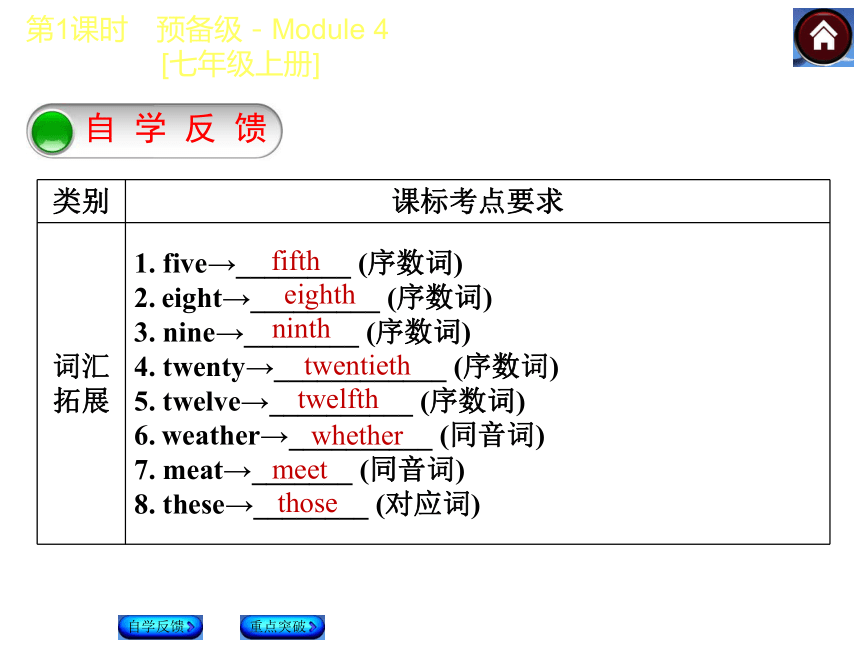
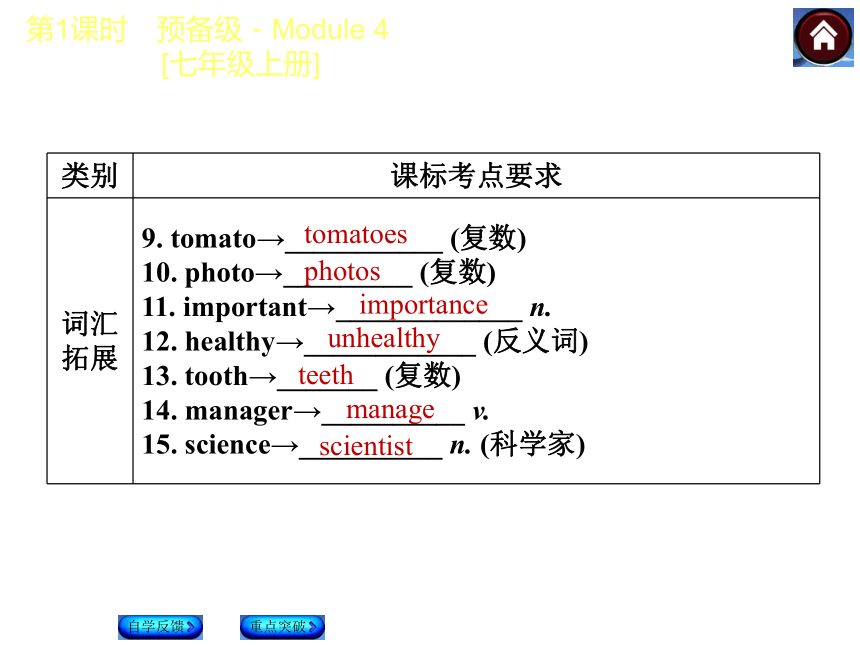
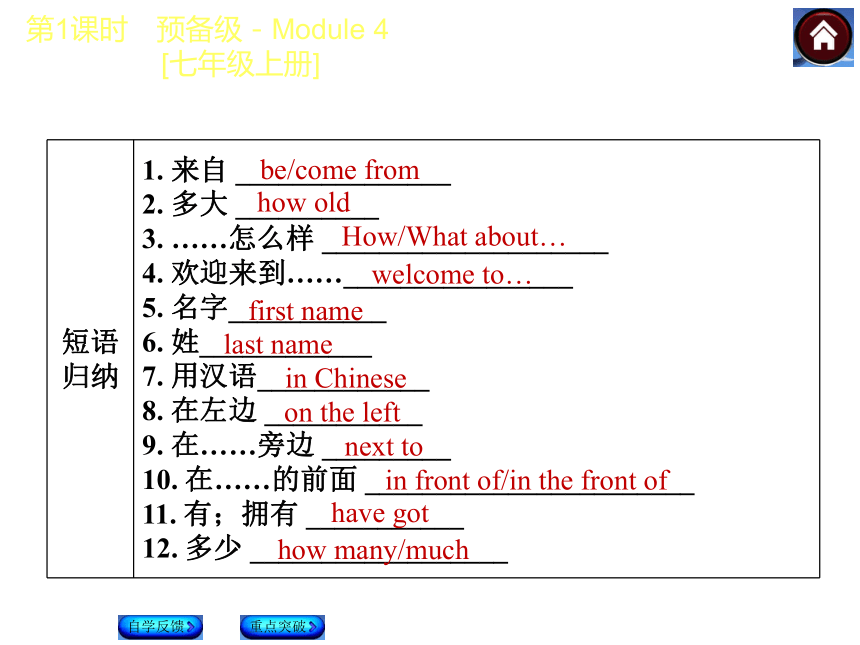
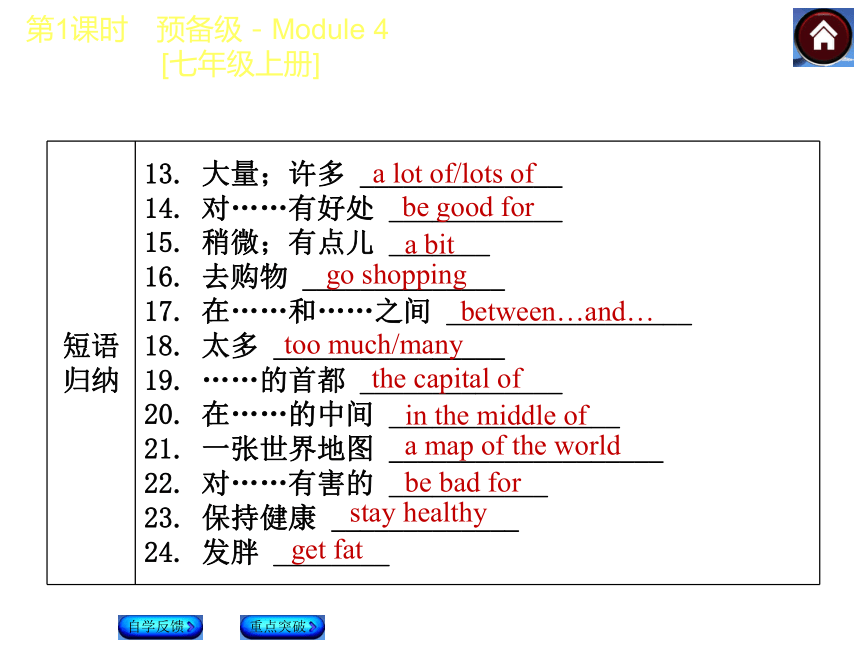
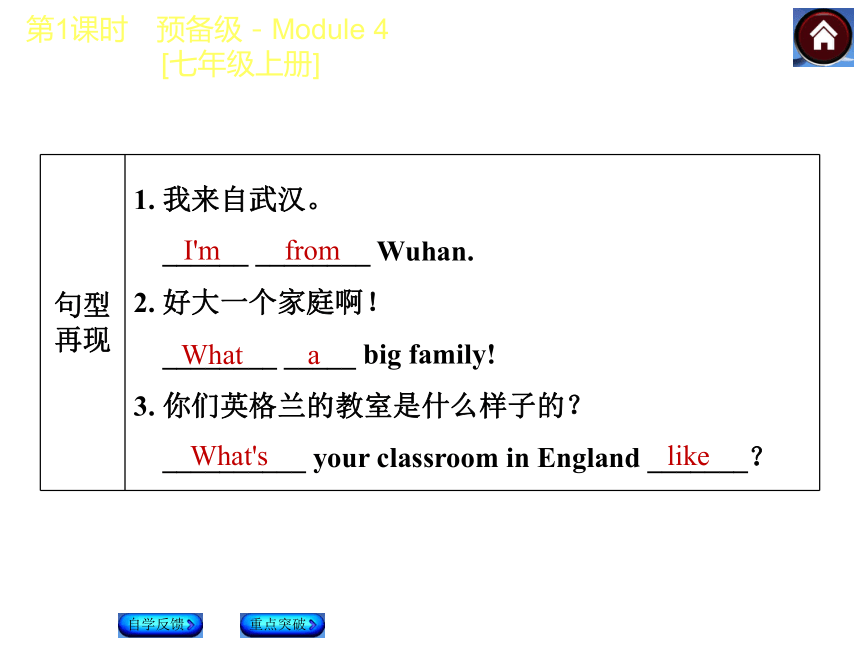
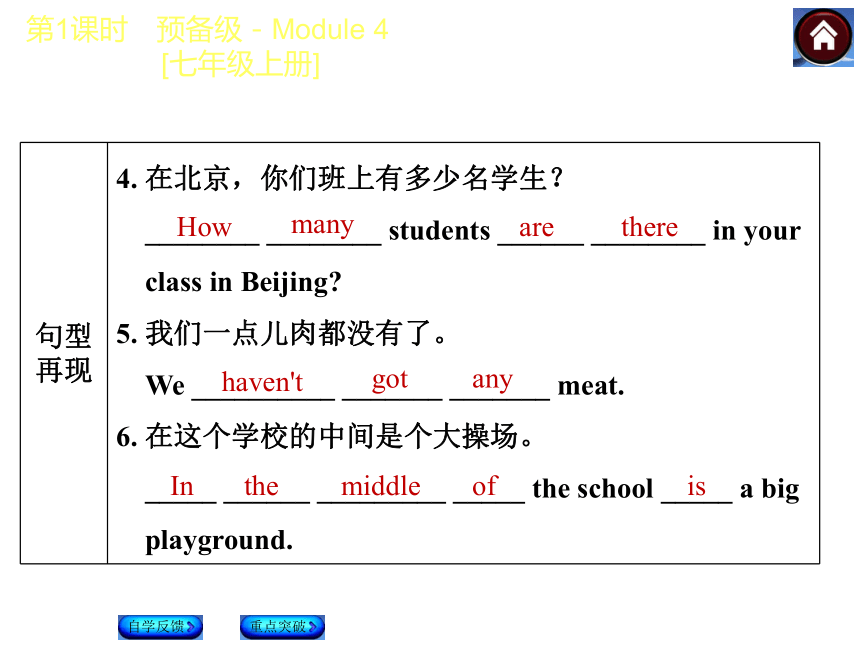
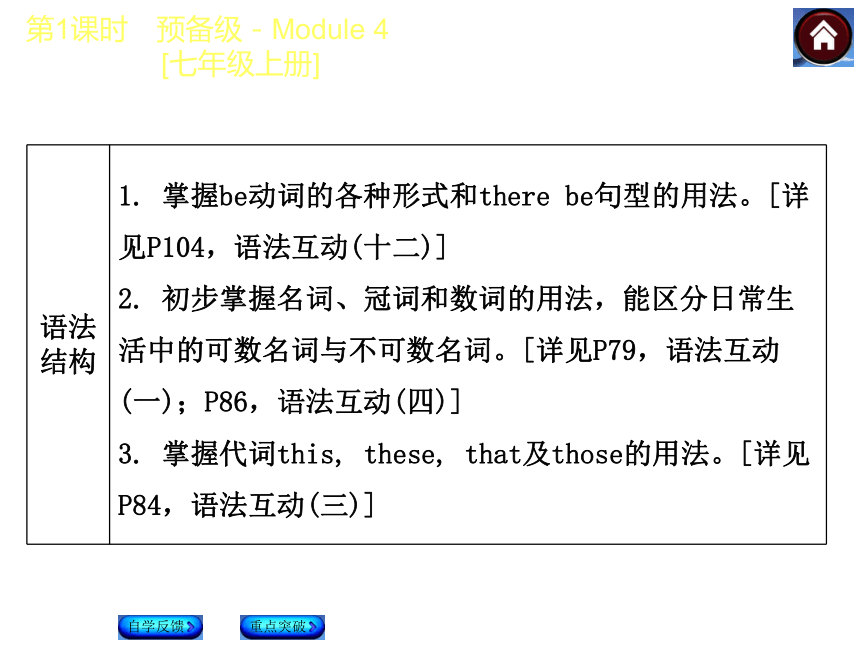
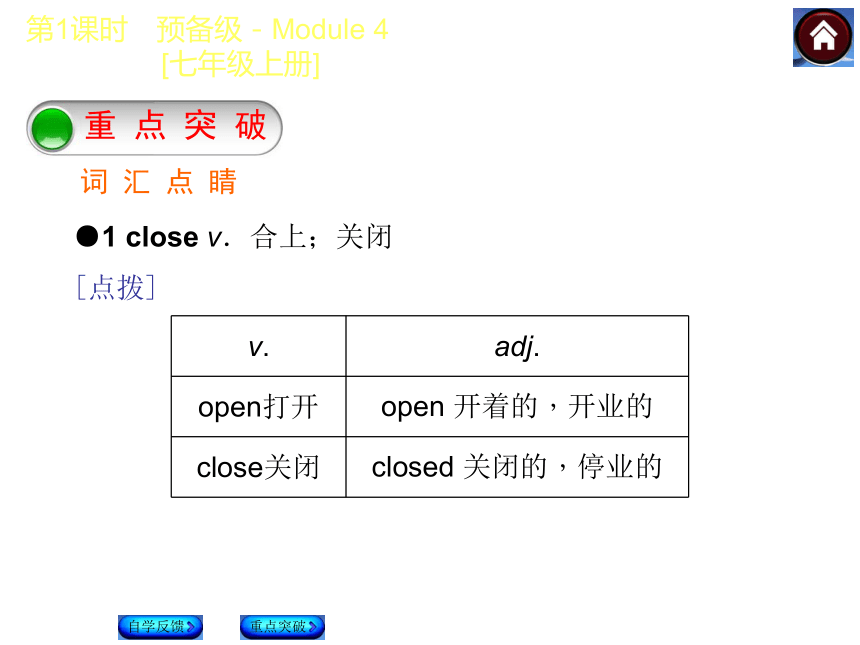
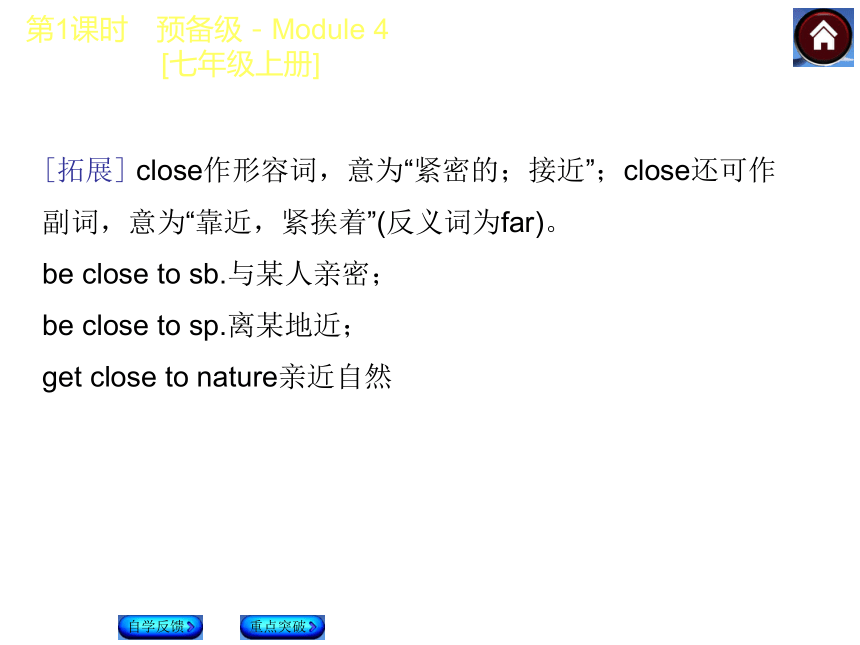
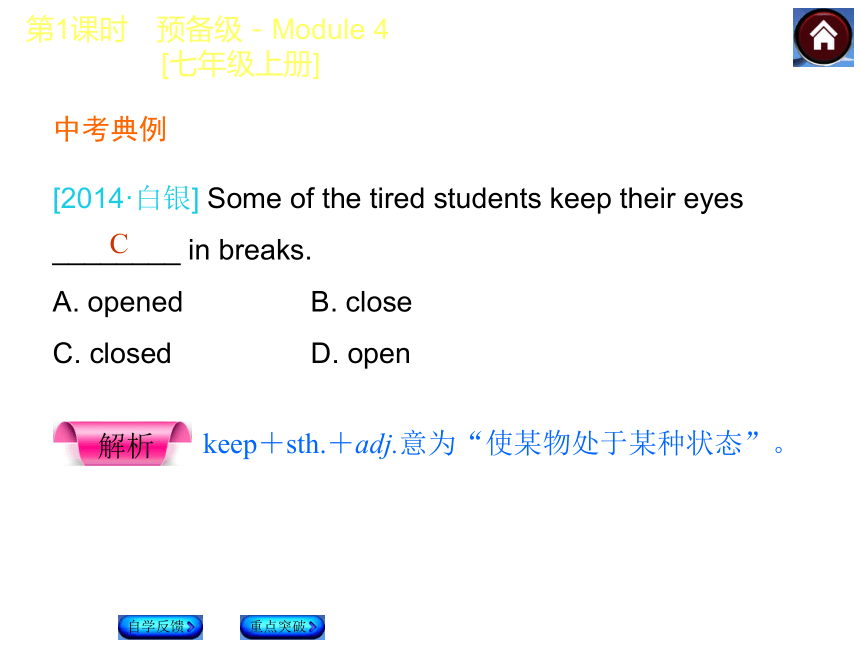
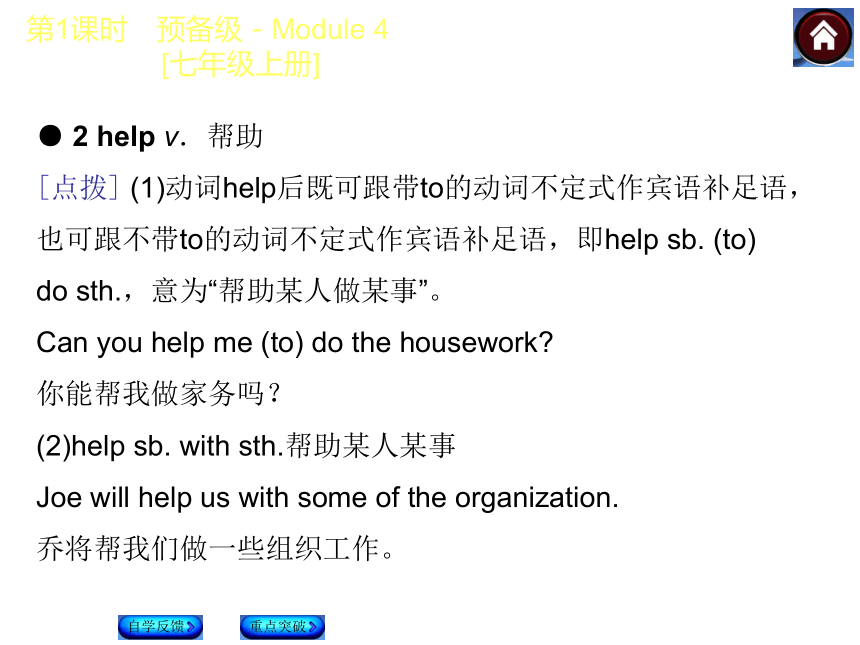
文档简介
课件40张PPT。第1课时 预备级-Module 4
[七年级上册]自 学 反 馈重 点 突 破第1课时 预备级-Module 4
[七年级上册]自 学 反 馈 nintheighthtwentiethwhethertwelfth meet fifththose自学反馈重点突破tomatoesphotosunhealthy importance scientist manageteeth第1课时 预备级-Module 4
[七年级上册]自学反馈重点突破how oldHow/What about…welcome to…first namelast namein Chineseon the leftnext toin front of/in the front of第1课时 预备级-Module 4
[七年级上册]自学反馈重点突破be/come fromhave gothow many/mucha lot of/lots ofbe good fora bitgo shoppingbetween…and…第1课时 预备级-Module 4
[七年级上册]自学反馈重点突破too much/manythe capital ofin the middle ofa map of the worldbe bad forstay healthyget fatI'm fromlikeWhataWhat's自学反馈重点突破第1课时 预备级-Module 4
[七年级上册]Howmanyare自学反馈重点突破第1课时 预备级-Module 4
[七年级上册]therehaven'tgotanyInthemiddleofis自学反馈重点突破第1课时 预备级-Module 4
[七年级上册]词 汇 点 睛●1 close v.合上;关闭
[点拨]重 点 突 破自学反馈重点突破第1课时 预备级-Module 4
[七年级上册]
[拓展] close作形容词,意为“紧密的;接近”;close还可作副词,意为“靠近,紧挨着”(反义词为far)。
be close to sb.与某人亲密;
be close to sp.离某地近;
get close to nature亲近自然自学反馈重点突破第1课时 预备级-Module 4
[七年级上册]中考典例[2014·白银] Some of the tired students keep their eyes ________ in breaks.
A. opened B. close
C. closed D. openC自学反馈重点突破第1课时 预备级-Module 4
[七年级上册]● 2 help v.帮助
[点拨] (1)动词help后既可跟带to的动词不定式作宾语补足语,也可跟不带to的动词不定式作宾语补足语,即help sb. (to) do sth.,意为“帮助某人做某事”。
Can you help me (to) do the housework?
你能帮我做家务吗?
(2)help sb. with sth.帮助某人某事
Joe will help us with some of the organization.
乔将帮我们做一些组织工作。自学反馈重点突破第1课时 预备级-Module 4
[七年级上册]
[搭配]
with the help of sb./with sb.'s help
在某人的帮助下
help yourself to…随便吃……
call for help求救
can't help doing sth.情不自禁做某事
help sb. out帮助某人摆脱(困境)自学反馈重点突破第1课时 预备级-Module 4
[七年级上册]典型例题My neighbour stopped smoking ________ the help of her family and friends.
A. by B. at C. in D. withD自学反馈重点突破第1课时 预备级-Module 4
[七年级上册]● 3 remember v.记住;想起
[点拨] remember作及物动词,后可接不定式或动名词作宾语,但两者有区别:
(1)remember to do sth. 记得去做某事(未做)
(2)remember doing sth. 记得做过某事(已做)
—Remember to turn off the light when you leave.
记着离开时把灯关掉。
—OK, I will. 好的,我会的。
Don't you remember seeing the man before?
你不记得以前见过那个人吗?自学反馈重点突破第1课时 预备级-Module 4
[七年级上册]中考典例[2014·成都] Kate, remember ________ for the sick to cheer them up.
A. to sing B. not to sing C. singingA自学反馈重点突破第1课时 预备级-Module 4
[七年级上册]● 4 buy v.买
[点拨] buy作及物动词,可接双宾语。若双宾语易位,通常要用介词 for,即buy sb. sth.=buy sth. for sb.,意为“给某人买某物”。
My father bought me an English dictionary.
=My father bought an English dictionary for me.
我爸爸给我买了一本英语词典。自学反馈重点突破第1课时 预备级-Module 4
[七年级上册]
[拓展] buy是终止性动词,因此不能与一段时间连用;若与一段时间连用,应用have或keep。
( ×)I have bought this house for ten years.
( √ )I have had this house for ten years.自学反馈重点突破第1课时 预备级-Module 4
[七年级上册]巧 辨 异 同●1 in front of 与in the front of自学反馈重点突破第1课时 预备级-Module 4
[七年级上册]The driver is sitting in the front of the taxi.
司机正坐在出租车的前面。 自学反馈重点突破第1课时 预备级-Module 4
[七年级上册]归纳总结
短语中有无定冠词的区别:
in hospital 生病住院 in the hospital 在医院里
go to school 去上学 go to the school 到学校去
at table 在吃饭 at the table 在桌子旁边
on earth 究竟 on the earth 在地球上自学反馈重点突破第1课时 预备级-Module 4
[七年级上册]● 2 between与amongWhat's the difference between the two words?
这两个词之间有什么区别?
He is sitting among the students.
他正坐在学生们中间。中考典例[2013·杭州] They usually go shopping ________ their lunch break.
against B. among
C. between D. duringD自学反馈重点突破第1课时 预备级-Module 4
[七年级上册]●3 too much与much too自学反馈重点突破第1课时 预备级-Module 4
[七年级上册]He drank too much water, so he couldn't run much too fast. 他喝了太多的水,所以他不能跑得太快。中考典例[2013·玉林] —The meat is ________ delicious.
—Yes, but don't eat ________.
A. too much; much too
B. much too; too much
C. too much; too much
D. much too; much tooB自学反馈重点突破第1课时 预备级-Module 4
[七年级上册]● 4 some与any自学反馈重点突破第1课时 预备级-Module 4
[七年级上册]自学反馈重点突破第1课时 预备级-Module 4
[七年级上册]If there is any trouble, please let me know.
如果有什么困难,请告诉我。
Would you like some tea?
你想喝茶吗?
Any student can answer this question.
任何一名学生都可以回答这个问题。中考典例[2014·天津] —Is there________ beef in the fridge?
—No, there isn't. There is ________ pork.
A. some; any B. any; any
C. some; some D. any; someD自学反馈重点突破第1课时 预备级-Module 4
[七年级上册]● 1 Is this your mum?这位是你妈妈吗?
[点拨] (1)向第三者介绍旁边的熟人时,用“this is…”句型。
Tony, this is my English teacher.
托尼,这位是我的英语老师。
(2)this 用于近指,that 用于远指。
What's that in the sky?
天空中那个东西是什么?句 型 透 视自学反馈重点突破第1课时 预备级-Module 4
[七年级上册](3)打电话时,用this 介绍自己,用that询问对方。
—Who's that?你是谁?
—This is Daming speaking.我是大明。
[拓展] 指示代词this/that在疑问句中作主语时,答语中一般不用this或that,而是用it/he/she来代替。自学反馈重点突破第1课时 预备级-Module 4
[七年级上册]中考典例[2014·黔西南] —Hello, may I speak to Jane?
—________
A. Who are you? B. What's wrong?
C. This is Jane speaking. C. She is Jane.C自学反馈重点突破第1课时 预备级-Module 4
[七年级上册]●2 There are thirty students in my class.我们班有30名学生。
[点拨] (1)there be 句型遵循“就近原则”,即be动词要与离它最近的主语在人称和数上保持一致。
There is a desk and two chairs in the classroom.
教室里有一张桌子和两把椅子。
(2)there be句型的一般将来时结构为:there will be或there is/are going to be,意为“将有”。注意:没有“there have/has”结构。
There is going to be a meeting tomorrow.明天将有个会议。自学反馈重点突破第1课时 预备级-Module 4
[七年级上册](3)there be sb. doing sth.意为“有人正在做某事”;there be sth. to do.意为“有某事要做”。
(4)在反意疑问句中,陈述部分是“there be”结构时,疑问部分用“be there”。
There is a tree in front of the building, isn't there?
大楼的前面有一棵树,不是吗?自学反馈重点突破第1课时 预备级-Module 4
[七年级上册]中考典例[2014·黔西南] There ________ a basketball match between Class One and Class Three this afternoon.
A. is going to be B. will have
C. are going to be D. is going to haveA自学反馈重点突破第1课时 预备级-Module 4
[七年级上册]● 3 What's your classroom in England like?
你们英格兰的教室是什么样子的?
[点拨] “What's…like?”意为“……是什么样子的?”常用来询问人的性格、品质或天气状况等。
—What's your mum like?
你妈妈怎么样?
—She is very kind.
她很善良。自学反馈重点突破第1课时 预备级-Module 4
[七年级上册][拓展] “What does/do +主语+look like?”意为“某人长什么样?”常用来询问人的外貌特征等。
—What does your mum look like?
你妈妈长什么样?
—She's very tall, and she has black hair.
她个子很高,留着一头黑发。自学反馈重点突破第1课时 预备级-Module 4
[七年级上册]● 4 We haven't got any meat.
我们一点儿肉都没有了。
[点拨] (1)have/has got中的have/has是助动词,无实际意义。其否定形式直接在have/has后加not;一般疑问句直接将have/has置于句首。变为反意疑问句时,疑问部分的谓语直接用have/has或haven't/hasn't。
They have got some books.
疑问句:Have they got any books?
反意疑问句:They have got some books, haven't they?自学反馈重点突破第1课时 预备级-Module 4
[七年级上册](2)have 若译为“有,吃,喝,上课”等,则为实义动词。其否定句、疑问句和反意疑问句需借助助动词do/does/did。
I have some books.
疑问句:Do you have any books?
反意疑问句:You have some books, don't you?自学反馈重点突破第1课时 预备级-Module 4
[七年级上册]1. John has breakfast every day, ________?
A.does he B.doesn't he
C.has he D.hasn't he
2.—Hello, may I speak to John, please?
—________
A.Who are you? B.What's the matter?
C.This is John speaking. D.He is John.BC自学反馈重点突破第1课时 预备级-Module 4
[七年级上册]自学反馈重点突破第1课时 预备级-Module 4
[七年级上册]3.[2012·滨州] I am very thirsty. Could you please give me ________ water?
A. some B. little
C. many D. other
4.Hurry up,________ you will be late for school.
A. and B. but C. so D. or
5. Don't each too much ________.
A. meat B. potatoes C. pear D. applesADA自学反馈重点突破第1课时 预备级-Module 4
[七年级上册]6. Jim buys a book ________ me.
A. to B. with C. for D. of
7. There is a supermarket ________ my home.
A. at front B. at the front of
C. in front of D. in the front of
8. There ________ a blackboard and twenty chairs in my classroom.
A. are B. is C. have D. hasCCB
[七年级上册]自 学 反 馈重 点 突 破第1课时 预备级-Module 4
[七年级上册]自 学 反 馈 nintheighthtwentiethwhethertwelfth meet fifththose自学反馈重点突破tomatoesphotosunhealthy importance scientist manageteeth第1课时 预备级-Module 4
[七年级上册]自学反馈重点突破how oldHow/What about…welcome to…first namelast namein Chineseon the leftnext toin front of/in the front of第1课时 预备级-Module 4
[七年级上册]自学反馈重点突破be/come fromhave gothow many/mucha lot of/lots ofbe good fora bitgo shoppingbetween…and…第1课时 预备级-Module 4
[七年级上册]自学反馈重点突破too much/manythe capital ofin the middle ofa map of the worldbe bad forstay healthyget fatI'm fromlikeWhataWhat's自学反馈重点突破第1课时 预备级-Module 4
[七年级上册]Howmanyare自学反馈重点突破第1课时 预备级-Module 4
[七年级上册]therehaven'tgotanyInthemiddleofis自学反馈重点突破第1课时 预备级-Module 4
[七年级上册]词 汇 点 睛●1 close v.合上;关闭
[点拨]重 点 突 破自学反馈重点突破第1课时 预备级-Module 4
[七年级上册]
[拓展] close作形容词,意为“紧密的;接近”;close还可作副词,意为“靠近,紧挨着”(反义词为far)。
be close to sb.与某人亲密;
be close to sp.离某地近;
get close to nature亲近自然自学反馈重点突破第1课时 预备级-Module 4
[七年级上册]中考典例[2014·白银] Some of the tired students keep their eyes ________ in breaks.
A. opened B. close
C. closed D. openC自学反馈重点突破第1课时 预备级-Module 4
[七年级上册]● 2 help v.帮助
[点拨] (1)动词help后既可跟带to的动词不定式作宾语补足语,也可跟不带to的动词不定式作宾语补足语,即help sb. (to) do sth.,意为“帮助某人做某事”。
Can you help me (to) do the housework?
你能帮我做家务吗?
(2)help sb. with sth.帮助某人某事
Joe will help us with some of the organization.
乔将帮我们做一些组织工作。自学反馈重点突破第1课时 预备级-Module 4
[七年级上册]
[搭配]
with the help of sb./with sb.'s help
在某人的帮助下
help yourself to…随便吃……
call for help求救
can't help doing sth.情不自禁做某事
help sb. out帮助某人摆脱(困境)自学反馈重点突破第1课时 预备级-Module 4
[七年级上册]典型例题My neighbour stopped smoking ________ the help of her family and friends.
A. by B. at C. in D. withD自学反馈重点突破第1课时 预备级-Module 4
[七年级上册]● 3 remember v.记住;想起
[点拨] remember作及物动词,后可接不定式或动名词作宾语,但两者有区别:
(1)remember to do sth. 记得去做某事(未做)
(2)remember doing sth. 记得做过某事(已做)
—Remember to turn off the light when you leave.
记着离开时把灯关掉。
—OK, I will. 好的,我会的。
Don't you remember seeing the man before?
你不记得以前见过那个人吗?自学反馈重点突破第1课时 预备级-Module 4
[七年级上册]中考典例[2014·成都] Kate, remember ________ for the sick to cheer them up.
A. to sing B. not to sing C. singingA自学反馈重点突破第1课时 预备级-Module 4
[七年级上册]● 4 buy v.买
[点拨] buy作及物动词,可接双宾语。若双宾语易位,通常要用介词 for,即buy sb. sth.=buy sth. for sb.,意为“给某人买某物”。
My father bought me an English dictionary.
=My father bought an English dictionary for me.
我爸爸给我买了一本英语词典。自学反馈重点突破第1课时 预备级-Module 4
[七年级上册]
[拓展] buy是终止性动词,因此不能与一段时间连用;若与一段时间连用,应用have或keep。
( ×)I have bought this house for ten years.
( √ )I have had this house for ten years.自学反馈重点突破第1课时 预备级-Module 4
[七年级上册]巧 辨 异 同●1 in front of 与in the front of自学反馈重点突破第1课时 预备级-Module 4
[七年级上册]The driver is sitting in the front of the taxi.
司机正坐在出租车的前面。 自学反馈重点突破第1课时 预备级-Module 4
[七年级上册]归纳总结
短语中有无定冠词的区别:
in hospital 生病住院 in the hospital 在医院里
go to school 去上学 go to the school 到学校去
at table 在吃饭 at the table 在桌子旁边
on earth 究竟 on the earth 在地球上自学反馈重点突破第1课时 预备级-Module 4
[七年级上册]● 2 between与amongWhat's the difference between the two words?
这两个词之间有什么区别?
He is sitting among the students.
他正坐在学生们中间。中考典例[2013·杭州] They usually go shopping ________ their lunch break.
against B. among
C. between D. duringD自学反馈重点突破第1课时 预备级-Module 4
[七年级上册]●3 too much与much too自学反馈重点突破第1课时 预备级-Module 4
[七年级上册]He drank too much water, so he couldn't run much too fast. 他喝了太多的水,所以他不能跑得太快。中考典例[2013·玉林] —The meat is ________ delicious.
—Yes, but don't eat ________.
A. too much; much too
B. much too; too much
C. too much; too much
D. much too; much tooB自学反馈重点突破第1课时 预备级-Module 4
[七年级上册]● 4 some与any自学反馈重点突破第1课时 预备级-Module 4
[七年级上册]自学反馈重点突破第1课时 预备级-Module 4
[七年级上册]If there is any trouble, please let me know.
如果有什么困难,请告诉我。
Would you like some tea?
你想喝茶吗?
Any student can answer this question.
任何一名学生都可以回答这个问题。中考典例[2014·天津] —Is there________ beef in the fridge?
—No, there isn't. There is ________ pork.
A. some; any B. any; any
C. some; some D. any; someD自学反馈重点突破第1课时 预备级-Module 4
[七年级上册]● 1 Is this your mum?这位是你妈妈吗?
[点拨] (1)向第三者介绍旁边的熟人时,用“this is…”句型。
Tony, this is my English teacher.
托尼,这位是我的英语老师。
(2)this 用于近指,that 用于远指。
What's that in the sky?
天空中那个东西是什么?句 型 透 视自学反馈重点突破第1课时 预备级-Module 4
[七年级上册](3)打电话时,用this 介绍自己,用that询问对方。
—Who's that?你是谁?
—This is Daming speaking.我是大明。
[拓展] 指示代词this/that在疑问句中作主语时,答语中一般不用this或that,而是用it/he/she来代替。自学反馈重点突破第1课时 预备级-Module 4
[七年级上册]中考典例[2014·黔西南] —Hello, may I speak to Jane?
—________
A. Who are you? B. What's wrong?
C. This is Jane speaking. C. She is Jane.C自学反馈重点突破第1课时 预备级-Module 4
[七年级上册]●2 There are thirty students in my class.我们班有30名学生。
[点拨] (1)there be 句型遵循“就近原则”,即be动词要与离它最近的主语在人称和数上保持一致。
There is a desk and two chairs in the classroom.
教室里有一张桌子和两把椅子。
(2)there be句型的一般将来时结构为:there will be或there is/are going to be,意为“将有”。注意:没有“there have/has”结构。
There is going to be a meeting tomorrow.明天将有个会议。自学反馈重点突破第1课时 预备级-Module 4
[七年级上册](3)there be sb. doing sth.意为“有人正在做某事”;there be sth. to do.意为“有某事要做”。
(4)在反意疑问句中,陈述部分是“there be”结构时,疑问部分用“be there”。
There is a tree in front of the building, isn't there?
大楼的前面有一棵树,不是吗?自学反馈重点突破第1课时 预备级-Module 4
[七年级上册]中考典例[2014·黔西南] There ________ a basketball match between Class One and Class Three this afternoon.
A. is going to be B. will have
C. are going to be D. is going to haveA自学反馈重点突破第1课时 预备级-Module 4
[七年级上册]● 3 What's your classroom in England like?
你们英格兰的教室是什么样子的?
[点拨] “What's…like?”意为“……是什么样子的?”常用来询问人的性格、品质或天气状况等。
—What's your mum like?
你妈妈怎么样?
—She is very kind.
她很善良。自学反馈重点突破第1课时 预备级-Module 4
[七年级上册][拓展] “What does/do +主语+look like?”意为“某人长什么样?”常用来询问人的外貌特征等。
—What does your mum look like?
你妈妈长什么样?
—She's very tall, and she has black hair.
她个子很高,留着一头黑发。自学反馈重点突破第1课时 预备级-Module 4
[七年级上册]● 4 We haven't got any meat.
我们一点儿肉都没有了。
[点拨] (1)have/has got中的have/has是助动词,无实际意义。其否定形式直接在have/has后加not;一般疑问句直接将have/has置于句首。变为反意疑问句时,疑问部分的谓语直接用have/has或haven't/hasn't。
They have got some books.
疑问句:Have they got any books?
反意疑问句:They have got some books, haven't they?自学反馈重点突破第1课时 预备级-Module 4
[七年级上册](2)have 若译为“有,吃,喝,上课”等,则为实义动词。其否定句、疑问句和反意疑问句需借助助动词do/does/did。
I have some books.
疑问句:Do you have any books?
反意疑问句:You have some books, don't you?自学反馈重点突破第1课时 预备级-Module 4
[七年级上册]1. John has breakfast every day, ________?
A.does he B.doesn't he
C.has he D.hasn't he
2.—Hello, may I speak to John, please?
—________
A.Who are you? B.What's the matter?
C.This is John speaking. D.He is John.BC自学反馈重点突破第1课时 预备级-Module 4
[七年级上册]自学反馈重点突破第1课时 预备级-Module 4
[七年级上册]3.[2012·滨州] I am very thirsty. Could you please give me ________ water?
A. some B. little
C. many D. other
4.Hurry up,________ you will be late for school.
A. and B. but C. so D. or
5. Don't each too much ________.
A. meat B. potatoes C. pear D. applesADA自学反馈重点突破第1课时 预备级-Module 4
[七年级上册]6. Jim buys a book ________ me.
A. to B. with C. for D. of
7. There is a supermarket ________ my home.
A. at front B. at the front of
C. in front of D. in the front of
8. There ________ a blackboard and twenty chairs in my classroom.
A. are B. is C. have D. hasCCB
